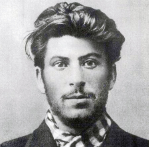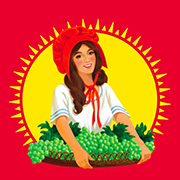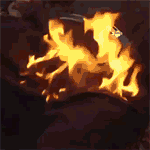(Thread IKs:
dead gay comedy forums)
|
https://twitter.com/plbmagazine/status/1688950554796716033?s=20 Domenico Losurdo's Stalin book is getting an official English language release finally
|
|
|
|

|
| # ? May 28, 2024 01:56 |
|
I got my copy already. I'm almost halfway through and I found three typos. Other than that it's better than the other translation.
|
|
|
|
Atrocious Joe posted:https://twitter.com/plbmagazine/status/1688950554796716033?s=20 
|
|
|
|
|
|
|
|
Pentecoastal Elites posted:moreover, capital is the medium which these particular institutions are built from. You can't remove capitalism without dismantling the structures that keep it in place: if you want to tear down a house you have to remove the walls and roof at some point. Once those structures are gone, there is no more of that stuff to reconstitute similar social structures. The institutions can't take hold because there is nothing for them to embed themselves in. if you want some non-doomer actually hopeful stuff for once, and not purely production-focused (e.g. "Four Futures"), there's some good accounts out there of the Great Leap Forward and how the attempt to decommodify production/exchange rippled and cascaded into interpersonal relationships. just cool poo poo, barely graspable, like a tesseract or an echo from the future Sunny Side Up has issued a correction as of 20:35 on Aug 9, 2023 |
|
|
|
Sunny Side Up posted:if you want some non-doomer actually hopeful stuff for once, and not purely production-focused (e.g. "Four Futures"), there's some good accounts out there of the Great Leap Forward and how the attempt to decommodify production/exchange rippled and cascaded into interpersonal relationships. just cool poo poo, barely graspable, like a tesseract or an echo from the future I love that stuff. Any recs? For a while I got into similar periods in Cuban and Russian history and it's both incredibly inspiring and heartbreaking how once regular rear end normal people get involved with the revolutionary project everything just clicks into place. You get like, completely uneducated totally illiterate farmers who generate these completely salient and often profound marxist analyses in the immediate postrevolutionary period, not because they read anything (though I don't doubt everyone was talking about the relevant theory), but because they lived the revolutionary process, and its like... man if we started there? if that's where everyone was by say like 1930 or whatever? impossible to think about in the same way the sun is too bright to look at.
|
|
|
|
Pentecoastal Elites posted:I love that stuff. Any recs? Let me see what I can dig up, my memories are scattered around a bunch of different pamphlets and books :-) Pentecoastal Elites posted:For a while I got into similar periods in Cuban and Russian history and it's both incredibly inspiring and heartbreaking how once regular rear end normal people get involved with the revolutionary project everything just clicks into place. You get like, completely uneducated totally illiterate farmers who generate these completely salient and often profound marxist analyses in the immediate postrevolutionary period, not because they read anything (though I don't doubt everyone was talking about the relevant theory), but because they lived the revolutionary process, and its like... man if we started there? if that's where everyone was by say like 1930 or whatever? impossible to think about in the same way the sun is too bright to look at.
|
|
|
|
Atrocious Joe posted:https://twitter.com/plbmagazine/status/1688950554796716033?s=20 PDF is up now.
|
|
|
|
oh sweet jesus is volume 3 a breath of fresh air after trudging through volume 2
|
|
|
|
Thomas Mann posted:To place Russian communism and Nazi-fascism on the same moral plane, in
|
|
|
|
Raskolnikov38 posted:oh sweet jesus is volume 3 a breath of fresh air after trudging through volume 2 That's just Capital you're reading, right?
|
|
|
|
yeah, aiming to finish it before august is done but we'll see
|
|
|
|
Raskolnikov38 posted:oh sweet jesus is volume 3 a breath of fresh air after trudging through volume 2 circulation of capital is important stuff as is the method of looking at epicycles from different start and end points but it could've been 200 or 300 pages shorter. so could volume 1 really
|
|
|
|
Raskolnikov38 posted:oh sweet jesus is volume 3 a breath of fresh air after trudging through volume 2 right?? there's a lot of fun and immediately relevant stuff in there   also:  
|
|
|
|
–Saul Alinsky
|
|
|
|
Rudolf Meidner
|
|
|
|
that's the matt bruenig argument too
|
|
|
|
|
Seeing the replies and QTs to this, people saying if the government try take their property they'd do the same, along with salting the land so the Black people starve. And it suddenly makes so much sense why Dekulakization was necessary. https://twitter.com/AdvoBarryRoux/status/1689941425360605184?s=20
|
|
|
|
Marenghi posted:Seeing the replies and QTs to this, people saying if the government try take their property they'd do the same, along with salting the land so the Black people starve. I never made the connection but there's a fair amount of overlap between the kulaks and the boere. Difference is the boere have been whining about this for 30 years and still have all their land and power.
|
|
|
|
https://www.youtube.com/watch?v=a6NJitdq8Bk
|
|
|
|
talking about dekulakization with anticommunists is funny because they'll exist in a state of quantum superposition where on one hand the cruel communists deliberately starved everyone to discipline them and on the other hand the brave landlords (oppressed) (smol) nobly chose death before dishonor just like anyone would. i've seen someone flip back and forth over whether it was the communists or the kulaks who actually slaughtered the cattle depending on whether it was rhetorically useful in the moment
|
|
|
|
Ferrinus posted:talking about dekulakization with anticommunists is funny because they'll exist in a state of quantum superposition where on one hand the cruel communists deliberately starved everyone to discipline them and on the other hand the brave landlords (oppressed) (smol) nobly chose death before dishonor just like anyone would. i've seen someone flip back and forth over whether it was the communists or the kulaks who actually slaughtered the cattle depending on whether it was rhetorically useful in the moment These are also people who view slave owners as the founders of freedom, so they are clearly very well training in doublethink
|
|
|
|
the sans kulaks
|
|
|
|
There's a definite cognitive dissonance in people who say the communists caused the famines while also believing that it's the right of the small business people to destroy their own crops and livestock rather than let big government seize it. And then there's the ones who just outright deny a small business person would destroy their own property rather than let it be given away for free. Ignoring the historical events in the US where that did happen. Whole food just destroyed rather than allowing it's price to fall during the Depression. And then there's always people who will take advantage of their fellows during crisis. During the Irish famine shopkeepers known as Gombeen's profiteered, selling food at outrageous markup on credit ensuring the buyers would be indebted to them for a long time after conditions improved. Though you'll rarely find an honest report of de-kulakization, it seems the only people really interested in writing about it were cold warriors like Robert Conquest, Anne Applebaum, and Aleksandr Solzhenitsyn.
|
|
|
|
The problem with "dekulakization", as a concept, is that it deals with a foreign category which certain people were able to twist it very effectively for the right audience. For many with only the barest familiarity about the topic, "kulak" became equated to the American homestead farmer and such, which loving lmao never was the case. The trick came from kulaks being technically part of the peasantry, a convenient misinterpretation. The kulaks proper were rentiers/landowners outside the aristocracy; this was possible because have you seen the loving size of that country? Once serfdom was over, the luckier part of the peasantry with some money to spare could hire two or three hands and gtfo somewhere else. Kulaks became richer than many aristocrats because the latter class left much to be desired in organization of productive forces; kulaks, focusing merely on basics, benefitted from that lack of interest of that Russian class as a whole. By the time of the Revolution, the proper kulak wasn't a peasant, it was a rentier landowner. The sleight of hand becomes more clever here; those who supported the system for whatever reason, either as sharecroppers or tenant farmers, got also to be called "kulaks" in foreign historiography; on the contrary, the low and middle peasantry were strongly anti-kulak and indeed were the force of attack here (when I said before and elsewhere that dekulakization was a mini-civil war, I wasn't figurative: the revolutionary peasantry was taking land by force). And on that note J.V. Stalin, "On The Grain Front", 1928 posted:Question: What should be considered as the basic cause of our difficulties in the matter of the grain supply? What is the way out of these difficulties? What, in connection with these difficulties, are the conclusions that must be drawn as regards the rate of development of our industry, particularly from the point of view of the relation between the light and heavy industries? J.V. Stalin, "Concerning Questions of Agrarian Policy in the U.S.S.R.", 1929 posted:[...]
|
|
|
|
Btw, I think Stalin's rationale there was sound, but his side miscalculated quite a bit in terms of structural effects, also because of the trading policy of agricultural exports. In the more aggressive phase, it seems they considered that production would be absorbed without much loss upon seizure, when in actuality land was being as ruined as possible and kulaks were also destroying collectivized property back. In there, I think Trotsky had a point: seizing the advantage of initiative and negotiating imports to hammer the kulaks while they were also still reeling would have hurt less than letting them acquire a rather reasonable strength which was underestimated, imho
|
|
|
|
stalin and trotsky were both wrong, they should have just let consolidated agribusiness develop under a few national champions and then nationalized it.
|
|
|
|
think i asked this before, but are there good resources on how collective was implemented in the PRC, and why the rollout wasn't a big disaster like it was in the USSR?
|
|
|
|
mila kunis posted:think i asked this before, but are there good resources on how collective was implemented in the PRC, and why the rollout wasn't a big disaster like it was in the USSR? imo they had these serious advantages in particular: 1) Zhou and Mao knew their poo poo about Soviet history and the revolution; 2) The revolutionary war in China got intertwined with a war of national liberation, which provided an entirely different starting structure of governance to carry out policies (while the Soviet Union had to contend with the incorporation of the former imperial state) 3) Socialism with Chinese Characteristics meant a different interpretation of the economic role of the peasantry, which is a millennia-old ancient social category there, after all. The peasantry could adapt to collectivization without difficulty (iirc). But they also faced issues, because rich peasants are also an ancient social category and they did their fair share of wrecking; the Chinese revolutionary state pursued a far more aggressive policy there than Stalin did. On the other hand, it was a very complicated start with the absurd flood of the Yellow River in 1958, which set back the efforts of recovering the obscenely underdeveloped and destroyed agricultural capacity from the decades prior, so famine ensued.
|
|
|
|
mila kunis posted:think i asked this before, but are there good resources on how collective was implemented in the PRC, and why the rollout wasn't a big disaster like it was in the USSR? I'm admittedly light on details, but the vibe from Search for a modern China and this Deng biography I just finished is: 1. Chinese agriculture was much more backward and hurting from ww2, so basic poo poo like "put all these plots together and use a tractor" got them real far 2. Mao had a lot of hands-on experience doing land reform in the jinggangshan, so policies were poised to take advantage of things like collectivizing what were normally annoyingly laid out strips of land which rendered mechanization useless 3. post-Mao, collectivization wasn't a hard and fast rule, so Deng (and I think Hua?) relaxed collectivization and allowed more work on private plots, and later in the 90s policy pushed back towards collectivization as better mechanization outstripped the production gains from allowing for a profit motive.
|
|
|
|
is the penguin edition of capital regarded as good? i just found an error in vol 3 chapter 6 it should read, according to the marxist.com version: quote:Should the price of raw material fall by an amount = d, then s/C, or s/(c + v) becomes s/(C - d), or s/((c - d) + v). Thus, the rate of profit rises. Conversely, if the price of raw material rises, then s/C, or s/(c + v), becomes s/(C + d), or s/((c + d) + v), and the rate of profit falls. however the penguin edition reads: quote:Should the price of raw material fall by an amount = d, then s/C, or s/(c + v) becomes s/(C - d), or s/((c - d) + v), and the rate of profit falls. which threw me for a loop because obvisiouly the math does not work that way and contradicts exactly what marx is saying lol
|
|
|
|
Raskolnikov38 posted:is the penguin edition of capital regarded as good? i just found an error in vol 3 chapter 6 
|
|
|
|
Raskolnikov38 posted:is the penguin edition of capital regarded as good? i just found an error in vol 3 chapter 6 Penguin contradict themselves. It looks like they edited the sentence to be shorter but mangled the meaning. At least it's an easy mistake to catch. If the price of materials go down the rate of profit increases. Marenghi has issued a correction as of 23:06 on Aug 13, 2023 |
|
|
|
you should write a letter to the editor
|
|
|
|
Marenghi posted:Penguin contradict themselves. It looks like they edited the sentence to be shorter but mangled the meaning. yeah but now i'm worried about other mistakes that may have gone unnoticed. foolish me for trusting the capitalist printed book over the soviet originated free epub
|
|
|
|
https://maoistcultexposed.wordpress.com
|
|
|
|
Could someone help me with this? What is the obsession with growth in Capitalism, aside from greed? I assume Marx said it was essential to Capitalism but is it really that essential to it's survival? Would the whole system collapse if you weren't continuously maintaining growth?
|
|
|
|
Investment is predicated on growth, there's no reason to invest in a company if it's not going to be worth more next year, or next quarter or whatever. Marx goes more into the specifics of it in kapital vol 1, but essentially the entire system requires neverending growth or it just collapses into recession and disaster. Since neverending growth is impossible in an extractive and exploitative system, we see a cycle of collapse and recession throughout capitalist history. e: essentially if you're not growing then someone else is going to come in and eat your lunch and take up the slack from your stagnant business. All the motivating structures in capitalism boil down to "grow or die", a stagnant business is treated the same as a dying one, and investors will rapidly drop the stock, which drops the price of the company, which means that it's not worth anything anymore and all the extra debts and poo poo that it took when it thought it was worth a shitload are now unpayable. Non-profit organizations don't need to generate unending profit and growth, as the name implies, but unless they work in a field in which profit is not a realistic option (ostensibly charity, but under neoliberalism even that isn't guaranteed) they will always be outcompeted by companies with a growth model, as they attract investment and an opportunity to raise a shitzillion dollars and advertise and overproduce until the non-profit is dead. Miles Blundell has issued a correction as of 23:58 on Aug 15, 2023 |
|
|
|
No aliens
|
|
|
|

|
| # ? May 28, 2024 01:56 |
|
Miles Blundell posted:Investment is predicated on growth, there's no reason to invest in a company if it's not going to be worth more next year, or next quarter or whatever. Cool thanks. Missed the investment side of the equation.
|
|
|


































